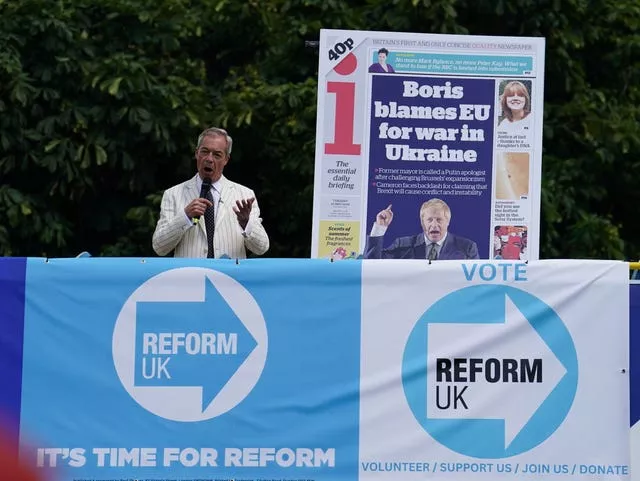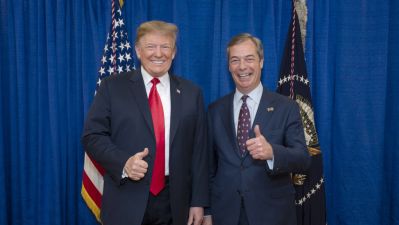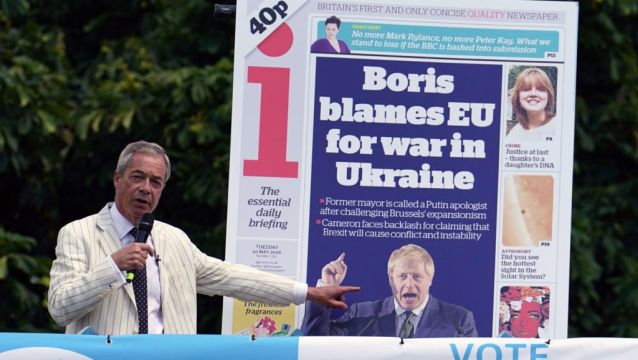Reform UK leader Nigel Farage said he would “never, ever defend” Russian president Vladimir Putin, as he ramped up his row with former British prime minister Boris Johnson.
At a campaign rally in Kent on Monday, Mr Farage unveiled a blown-up poster of the i newspaper’s front page from May 10th, 2016 with the headline “Boris blames EU for war in Ukraine”.
On Friday, Mr Farage told the BBC’s The Panorama Interviews programme that “we provoked this war”, in reference to countries in eastern Europe signing up to Nato and the European Union, and Russia’s invasion of Ukraine.
Writing in the Telegraph on Saturday, he urged readers not to “blame” him for “telling the truth about Putin’s war”.

Mr Johnson shared the article on X, formerly Twitter, calling Mr Farage’s views “morally repugnant”.
Referring to the Telegraph article, he wrote: “This is nauseating historical drivel and more Kremlin propaganda.”
In Kent on Monday, Mr Farage said he had been “more far-sighted” in predicting a war in Ukraine, telling the crowd: “This has been turned into ‘Farage makes outrageous statement’, ‘Farage defends Putin’ – well, I’ve done none of those things.
“I would never, ever defend Putin and I think his behaviour in Ukraine and elsewhere has been reprehensible.
“But if we’re going to think towards a peace at some time in the not too distant future, perhaps it might be helpful to understand what went wrong in the first place.”
As he unveiled the poster of the headline referring to Mr Johnson from the top deck of the Reform battle bus, Mr Farage said he was “alone” in predicting the war in Ukraine, adding: “I can’t take those words away and nor would I want to.”

Turning his fire on the former prime minister, Mr Farage said: “Well, perhaps it’s Boris Johnson that’s morally repugnant and not me, I don’t know. But can you see the sheer level of hypocrisy? Can you see the nonsense of all of this?”
He added: “This man will go down as the worst prime minister of modern times. A man who betrayed an 80-seat majority. Who opened the door to mass immigration? Boris Johnson. Who betrayed the will of Brexit voters? It was Boris Johnson. He pretended to be a Conservative but he governed as a Green.”
The Reform UK leader went on: “There’s been precious little debate on defence, precious little debate about the state of our armed forces, precious little debate about how little we still do in this country for our veterans, and precious, precious almost no debate on foreign policy.”
He added: “I have no doubt that the world is in a more dangerous place right now than it’s been at any point since the Cuban missile crisis over 60 years ago.
“A couple of years back we would have thought war on a global scale was inconceivable, but we now all, don’t we, harbour that doubt and that worry at the back of our minds?”

Later in his speech, Mr Farage did an impression of former US president Donald Trump, now a convicted criminal, whom he described as a “friend of mine”.
Mr Trump has spoked favourably about Mr Putin in the past and has threatened to cut US aid to Ukraine.
Mr Farage said: “Unless we start to build up our size, America will stop taking us seriously, Nato will stop taking us seriously and the world will be a more dangerous place.
“You don’t get peace through weakness. You get peace through strength. You get peace through deterrence, and that matters.
“I hardly need tell you the catastrophic failures we’ve seen under President (Joe) Biden. The withdrawal from Afghanistan, the handing of it back over to the Taliban after 20 years, was a sign of weakness that was seen by Putin, a sign of weakness that is increasingly being seen by China.”
UK home secretary James Cleverly accused Mr Farage of “echoing Putin’s vile justification for the brutal invasion of Ukraine” and shadow defence secretary John Healey said Mr Farage is “a Putin apologist who should never be trusted with our nation’s security”.


However, the Reform leader got the loudest cheers from his supporters as he discussed the party’s defining policy area – immigration.
After highlighting small boat crossings in the Channel, he said: “Remember, I went out four years ago, again and again, into the Channel to highlight what was going on, to say you might as well put a sign on the White Cliffs of Dover saying ‘Everyone welcome’.”
He added: “I warned that huge numbers would come, I even said there might be an invasion, which is of course the rudest word you could possibly use in BBC land, but now, 4,000 boats and 128,000 people later, it does look like it’s been an invasion to me – and it’s mostly young men.”







